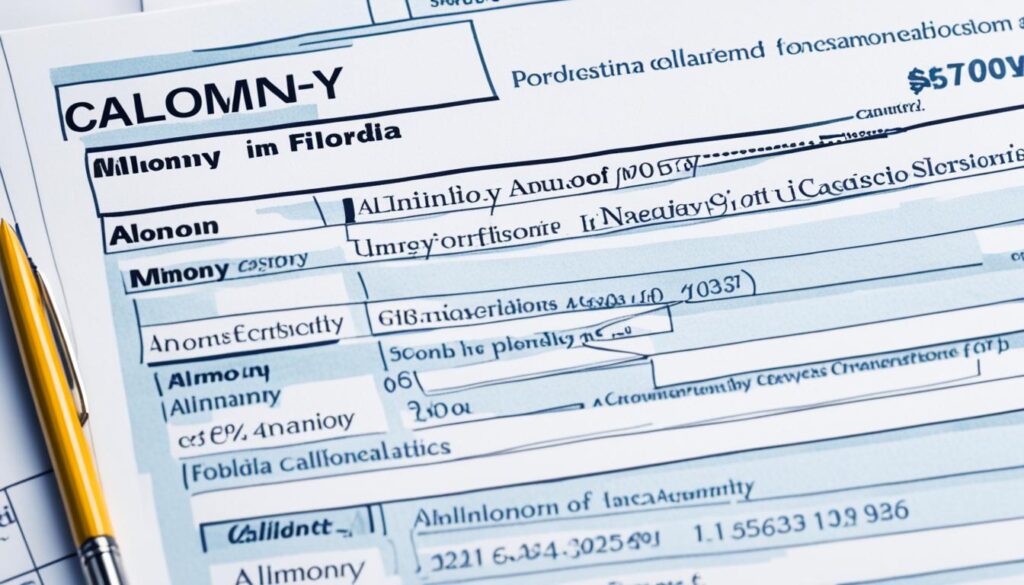Did you know that Florida is one of the states in the US with the highest divorce rates? Surprisingly, it is among the top five states for divorce rates, with over 55,000 divorce filings each year. Understanding Florida’s alimony laws is crucial for effectively navigating through these proceedings due to the high divorce rate.
Key Takeaways:
- Florida has one of the highest divorce rates in the United States.
- Over 55,000 divorces are filed in Florida each year.
- Understanding the alimony laws in Florida is crucial during divorce proceedings.
- Alimony in Florida is determined based on various factors, including the standard of living during the marriage and the financial resources of each party.
- There are different types of alimony in Florida, such as permanent, rehabilitative, bridge-the-gap, lump-sum, and durational alimony.
How Does Alimony Work in Florida?
Alimony in Florida is a complex aspect of divorce proceedings, with the court carefully considering various factors to make determinations. It is important to understand how alimony works in Florida to navigate the legal process effectively.
When determining alimony in Florida, the court takes into account several key factors:
- The standard of living established during the marriage
- The duration of the marriage
- The financial resources of each party
- The earning capacities of the parties
Unlike child support, there is no mathematical calculation for determining alimony in Florida. The court has broad discretion to decide entitlement to alimony, the amount of alimony, the duration of alimony, and the type of alimony to be awarded.
The court evaluates numerous factors when making alimony determinations, including:
- The age, physical, and emotional condition of the parties
- The financial resources and assets of each spouse
- The contributions made by each spouse to the marriage
- Other relevant factors as deemed important by the court
The court may also consider tax treatment and consequences, as well as all sources of income available to either party. It carefully assesses the financial situation and contribution of each spouse to determine a fair and equitable alimony arrangement.
It is essential to consult with an experienced family law attorney to understand how alimony may work in your specific circumstances, as each case is unique. They can provide guidance and ensure your rights and interests are protected throughout the process.
Alimony in Florida is a complex aspect of divorce proceedings, with the court carefully considering various factors to make determinations.

| Factors Considered for Alimony in Florida | Explanation |
|---|---|
| The standard of living established during the marriage | The court looks at the lifestyle and expenses maintained during the marriage to ensure an equitable alimony arrangement. |
| The duration of the marriage | The length of the marriage is considered to assess the level of support required following a divorce. |
| The financial resources of each party | The court examines the assets, income, and financial capabilities of both spouses to determine the need for alimony. |
| The earning capacities of the parties | The court assesses the income potential and job opportunities of each spouse to determine their ability to support themselves. |
Who is Entitled to Alimony in Florida?
In Florida, the legislative intent behind alimony laws is to ensure that a financially disadvantaged spouse does not suffer after a divorce. The court holds the breadwinning spouse responsible for preventing the other spouse from becoming homeless or lacking basic necessities. Both spouses are expected to maintain the same standard of living they enjoyed during the marriage. If one spouse cannot sustain that standard of living with their own income, the other spouse is required to provide supplemental support.
The court considers various factors when determining entitlement to alimony in Florida. These include the standard of living established during the marriage and the financial resources of each party involved. By considering these factors, the court aims to ensure that both spouses can maintain their previous lifestyle following the divorce.

How is Alimony Calculated in Florida?
Calculating alimony in Florida is a complex process that takes into account various factors. The court primarily considers the financial needs of the recipient spouse and the ability of the paying spouse to meet those needs. Unlike child support, there are no specific guidelines or formulas for calculating alimony in Florida, giving the court a wide discretion in determining the amount.
When determining the amount of alimony, the court considers the recipient’s financial need, which includes expenses for housing, transportation, healthcare, and other essential living costs. The court also evaluates the paying spouse’s ability to meet these needs, taking into account their income, assets, and liabilities.
In some cases, the court may impute income to a spouse who is earning less than their potential earning capacity. This means that the court may consider the spouse’s ability to earn a higher income based on their education, skills, work experience, and job opportunities.
Here is an example to illustrate the calculation of alimony in Florida:
| Recipient Spouse | Paying Spouse |
|---|---|
| Monthly Income: $3,000 | Monthly Income: $5,000 |
| Monthly Expenses: $2,500 | Monthly Expenses: $4,000 |
| Estimated Ability to Pay: $3,000 | |
| Financial Need: $500 |
In this example, the recipient spouse has a monthly income of $3,000 and monthly expenses of $2,500, resulting in a financial need of $500. The paying spouse has a monthly income of $5,000 and estimated ability to pay of $3,000. The court will consider these factors and other relevant circumstances to determine a fair and reasonable alimony amount.
It’s important to note that each case is unique, and the court will carefully evaluate the specific details and circumstances before making a final decision on the amount of alimony.

How Long Does Alimony Last in Florida?
When it comes to alimony in Florida, the duration of the payments depends on two key factors: the length of the marriage and the type of alimony awarded. The state follows a rebuttable presumption against permanent alimony in short-term marriages of seven years or less, while there is a rebuttable presumption for permanent alimony in long-term marriages lasting 17 years or more.
The type of alimony awarded also plays a role in determining its duration. In the case of short or moderate-term marriages, durational alimony is often awarded for a specific set period. This allows the recipient to receive financial support for a specified duration, giving them time to regain financial stability. However, it’s essential to note that an award of durational alimony terminates upon the death of either spouse or the remarriage of the recipient spouse.
The court has the authority to modify or terminate an award of permanent alimony if the recipient enters into a supportive relationship. This provides flexibility in adjusting alimony payments in evolving circumstances.

| Type of Alimony | Duration |
|---|---|
| Permanent alimony | Until recipient remarries or either spouse dies |
| Rehabilitative alimony | Until recipient becomes self-supporting through education or retraining |
| Bridge-the-gap alimony | Short-term to assist in transitioning from married to single life |
| Lump-sum alimony | One-time payment, typically for special circumstances |
| Durational alimony | Set period of time following a short or moderate-term marriage |
| Nominal alimony | Entitlement without sufficient resources for a larger award |
No matter the awarded type of alimony, it’s crucial to consult with a knowledgeable family law attorney for a better understanding of your specific situation and the potential duration of alimony payments in Florida.
If you have more than one type of alimony award, how do courts determine the duration and prioritize payments?
- The duration of each type of alimony will be determined based on the specific circumstances of the case.
- The court typically prioritizes the payment of alimony based on the order in which it was awarded.
- If the recipient remarries, the court may terminate the applicable alimony, depending on the terms of the divorce decree.
Understanding how long alimony lasts in Florida is crucial for both payers and recipients, as it allows individuals to plan for their financial futures and make informed decisions. With the court’s broad discretion in determining the duration of alimony and the potential for modification under certain circumstances, seeking legal advice is essential to navigate this complex area of law.
What are the Different Types of Alimony in Florida?
In Florida, there are several types of alimony that may be awarded depending on the circumstances of the case. These include permanent, rehabilitative, bridge-the-gap, lump-sum, durational, and nominal alimony.
Permanent alimony is awarded until the recipient remarries or either party dies. It is typically awarded in long-term marriages where one spouse is financially dependent on the other.
Rehabilitative alimony is intended to help the recipient become self-supporting through education or retraining. It is awarded for a specific duration and terminates once the recipient achieves self-sufficiency.
Bridge-the-gap alimony is awarded for a short duration to assist the recipient in transitioning from married to single life. It is meant to help the recipient cover immediate financial needs, such as housing or utilities.
Lump-sum alimony is a one-time payment typically awarded when there are special circumstances, such as the division of a large asset or to equalize the distribution of marital property. It provides a definite and final resolution to the alimony obligation.
Durational alimony is awarded for a set period of time following a short or moderate-term marriage. The duration of this type of alimony is tied to the length of the marriage and cannot exceed the length of the marriage.
Nominal alimony is awarded when there is entitlement, but insufficient resources available for a larger award. It is a symbolic amount, often a small sum, and is typically used when one party requires legal access to enforce or modify rights in the future.
Each type of alimony has its own purpose and is awarded based on the specific circumstances of the case. The court considers factors such as the length of the marriage, the financial resources of each party, and the ability to pay when deciding the appropriate type and amount of alimony.

How to Avoid Alimony in Florida?
When going through a divorce in Florida, some individuals may want to explore ways to avoid alimony obligations. While each case is unique and ultimately decided by the court, there are a few strategies that might help minimize or eliminate alimony payments.
1. Reach an Agreement:
One way to avoid alimony is to negotiate and reach an agreement with your spouse. Pre- or postnuptial agreements can effectively establish the terms of your divorce, including alimony obligations. By coming to a mutual understanding, you have more control over the outcome and can potentially avoid lengthy court battles.
2. Eliminate Financial Need:
Another approach is to address the financial need of the receiving spouse. The court considers both the obligee’s need and the obligor’s ability to pay when determining alimony. If the recipient can meet their own financial needs through their own resources or savings, the court may decide that no alimony obligation is necessary.
Remember, it’s important to consult with a knowledgeable family law attorney who can guide you through the legal process and help you understand your options. Each case is unique, and the court ultimately decides whether alimony is appropriate based on the specific circumstances.

Expert Tip:
“Having open and honest communication with your spouse during the divorce process can facilitate reaching a fair agreement that may help avoid or minimize alimony obligations.”
——-
Continue reading to learn more about the tax implications of alimony in Florida and how the amount of alimony is determined.
——-
Is Alimony Taxable in Florida?
In Florida, alimony is not taxable for divorces finalized from January 1, 2019, onwards. This means that the payer does not get a tax deduction for the alimony paid, and the recipient does not have to report alimony received as taxable income. It’s important to consult with a tax professional for specific guidance on the tax implications of alimony in your situation.
Alimony laws can be complex, and understanding the tax implications is crucial for both the payer and the recipient. Tax rules may vary depending on the year of divorce, so it’s essential to stay informed and seek professional advice to ensure compliance with tax requirements.
| Tax Year | Taxable Alimony | Non-Taxable Alimony |
|---|---|---|
| Before 2019 | Tax deductible for the payer Taxable income for the recipient |
– |
| From 2019 onwards | – | Not tax deductible for the payer Not taxable income for the recipient |
Please remember that the information provided here is a general overview, and it’s important to consult with a tax professional who can provide personalized advice based on your specific circumstances. Alimony laws and tax regulations can change, and you need the most up-to-date information to make informed decisions.

How Much is Alimony in Florida?
The amount of alimony in Florida can vary significantly depending on the specific circumstances of the case. While Florida law provides guidelines for estimating alimony obligations based on the gross annual income of the obligor and oblige, these guidelines are not mandatory.
The court has broad discretion in determining the amount of alimony, taking into consideration various factors such as the parties’ financial resources, needs, and ability to pay. To get a better understanding of how alimony may be calculated in your particular situation, it is advisable to consult with a qualified family law attorney.
An experienced attorney can assess the specific details of your case, including income, assets, and other relevant factors, to provide you with a more accurate estimate of the potential alimony amount.
Factors Considered in Calculating Alimony in Florida:
- Income and financial resources of each party
- Duration of the marriage
- Standard of living established during the marriage
- Contribution of each party to the marriage
- Earning capacities of the parties
- Financial needs of the recipient spouse
By evaluating these factors, the court aims to ensure that the recipient spouse can maintain a lifestyle similar to that enjoyed during the marriage, while considering the paying spouse’s ability to meet their financial obligations.
| Type of Alimony | Description |
|---|---|
| Permanent | Alimony awarded until recipient remarries or either party dies |
| Rehabilitative | Assistance provided to recipient spouse for education or retraining in order to transition towards self-support |
| Durational | Set period of time, typically awarded for short or moderate-term marriages |
| Nominal | Symbolic amount awarded when entitlement exists but insufficient resources are available for a larger award |
Keep in mind that every case is unique, and the amount of alimony can differ based on various factors. Consulting with a family law attorney will provide you with tailored guidance and help you navigate through the complexities of alimony calculations in Florida.

Is Florida an Alimony State?
Yes, Florida is a state where alimony may be awarded in divorce cases. Florida has different types of alimony available, and the court has discretion in determining whether alimony is appropriate based on the specific circumstances of the case.
Florida is one of the few states that offers bridge-the-gap alimony, which helps the recipient spouse meet short-term needs while transitioning from married to single life.
Benefits of Alimony in Florida
- Provides financial support for the recipient spouse
- Helps maintain the standard of living established during the marriage
- Assists the recipient in becoming self-supporting
- Ensures a fair distribution of financial resources after divorce
Factors Considered in Alimony Cases
- Standard of living established during the marriage
- Duration of the marriage
- Financial resources of each party
- Earning capacities of the parties
- Contributions made by each spouse to the marriage
The court carefully evaluates these factors to determine the appropriate type, amount, and duration of alimony in each case.

It’s important to consult with a knowledgeable family law attorney to understand the specific laws and guidelines surrounding alimony in Florida. They can provide guidance and support in navigating the complexities of divorce proceedings and advocating for your best interests.
What Qualifies You for Alimony in Florida?
When seeking alimony in Florida, several factors come into play to determine whether a spouse qualifies for financial support. These factors are crucial in the court’s decision-making process:
- Standard of living established during the marriage: The court considers the lifestyle that was maintained throughout the marriage to assess the financial needs of the requesting spouse after the divorce.
- Length of the marriage: The duration of the marriage is a significant factor in determining alimony. Typically, longer marriages are more likely to result in alimony awards, while shorter marriages may have different criteria.
- Financial resources of each party: The court examines the financial standing of both spouses, including incomes, assets, and liabilities, to assess the need for supplemental income.
- Earning capacities of the parties: The court evaluates the ability of each spouse to generate income based on education, skills, work experience, and employability.
- Contributions made by each spouse to the marriage: The court takes into account the financial and non-financial contributions made by each spouse during the marriage, including child-rearing, homemaking, career sacrifices, and supporting the other spouse’s education or career advancement.
- Age, physical condition, and mental condition: The court considers the age, health, and mental well-being of both spouses when determining a spouse’s eligibility for alimony.
It’s important to note that each case is unique, and the court carefully evaluates all relevant factors before reaching a decision on alimony. Consulting with a skilled family law attorney who specializes in Florida alimony laws can help navigate the complexities and ensure that your rights and interests are protected.
| Qualifying Factors | Description |
|---|---|
| Standard of living | Lifestyle established during the marriage |
| Length of the marriage | Duration of the marital relationship |
| Financial resources | Incomes, assets, and liabilities of both parties |
| Earning capacities | Ability to generate income |
| Contributions to the marriage | Financial and non-financial support provided |
| Age, physical condition, and mental condition | Spouse’s health and well-being |

Conclusion
Alimony in Florida is a complex aspect of divorce law that requires careful consideration of various factors. The court possesses significant discretion in determining the amount, duration, and type of alimony awarded. Factors such as the standard of living, the length of the marriage, the financial resources of each party, and the earning capacities of the individuals are taken into account during this process. To navigate the complexities of divorce Florida alimony laws effectively and ensure the protection of your rights and obligations, it is crucial to consult with a knowledgeable family law attorney.
By seeking guidance from a professional, you can gain a comprehensive understanding of the intricacies involved in alimony cases and better advocate for your interests. A skilled family law attorney can provide personalized advice and representation, helping you navigate the legal landscape with confidence. Whether you are seeking alimony or exploring strategies to mitigate potential obligations, having an experienced attorney by your side can make a significant difference in the outcome of your case.
In conclusion, understanding the nuances of alimony in Florida is paramount when going through a divorce. Given the discretionary nature of the court’s decisions, working with a knowledgeable legal professional who specializes in family law is essential. By doing so, you can ensure that your financial interests are protected and that you have the best possible outcome in your alimony case.
FAQ
How does alimony work in Florida?
Alimony in Florida is determined by the court based on various factors such as the standard of living during the marriage, the duration of the marriage, the financial resources of each party, and the earning capacities of the parties. The court has the discretion to decide the amount, duration, and type of alimony based on the specific circumstances of the case.
Who is entitled to alimony in Florida?
Entitlement to alimony in Florida is determined by the court, considering factors such as the standard of living established during the marriage and the financial resources of each party. The court aims to ensure that an impecunious spouse does not become financially vulnerable after divorce, and both spouses are expected to continue enjoying the same standard of living they had during the marriage.
How is alimony calculated in Florida?
There is no specific mathematical calculation for determining alimony in Florida. The court has broad discretion in deciding entitlement to alimony, the amount of alimony, the duration of alimony, and the type of alimony. The court considers factors such as the parties’ age, physical and emotional condition, financial resources, and contribution to the marriage when making a determination.
How long does alimony last in Florida?
The duration of alimony in Florida depends on the length of the marriage and the type of alimony awarded. There is a rebuttable presumption against permanent alimony in short-term marriages (7 years or less) and a rebuttable presumption for permanent alimony in long-term marriages (17 years or more). The court may also award durational alimony for a set period of time following a short or moderate-term marriage.
What are the different types of alimony in Florida?
In Florida, there are several types of alimony that may be awarded depending on the circumstances of the case. These include permanent, rehabilitative, bridge-the-gap, lump-sum, durational, and nominal alimony. Each type serves a different purpose and has different characteristics.
How to avoid alimony in Florida?
One way to avoid an alimony obligation in Florida is to reach an agreement with your spouse through pre- or postnuptial agreements. Another way is to eliminate the financial need of the other spouse. However, each case is unique, and the court ultimately decides whether alimony is appropriate based on the specific circumstances.
Is alimony taxable in Florida?
In Florida, alimony is not taxable for divorce cases finalized from January 1, 2019, onwards. This means that the payer does not get a tax deduction for the alimony paid, and the recipient does not have to report alimony received as taxable income.
How much is alimony in Florida?
The amount of alimony in Florida varies greatly depending on the specific circumstances of the case. The court considers factors such as the parties’ financial resources, needs, and ability to pay when calculating the amount of alimony. There are no specific guidelines or formulas for calculating alimony in Florida, and the court has discretion in determining the amount.
Is Florida an alimony state?
Yes, Florida is a state where alimony may be awarded in divorce cases. The court has discretion in determining whether alimony is appropriate based on the specific circumstances of the case.
What qualifies you for alimony in Florida?
Several factors are considered when determining whether a spouse qualifies for alimony in Florida. These include the standard of living established during the marriage, the length of the marriage, the financial resources of each party, the earning capacities of the parties, and the contributions made by each spouse to the marriage. The court will consider all relevant factors before making a decision on alimony.










